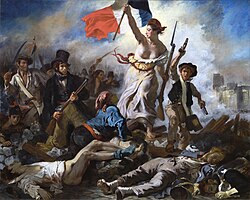
Back Revolution von oben German 上からの改革 Japanese Революция сверху Russian Yuqoridan inqilob Uzbek 自上而下的革命 Chinese
| Part of a series on |
| Political revolution |
|---|
 |
|
|
A revolution from above refers to major political and social changes that are imposed by an élite on the population it dominates. It usually occurs in urban areas in a capital city. By contrast, the plain term "revolution" suggests that pressure from below is a major driving force in events, even if other social groups cooperate with—or ultimately capture—the movement. The phrase "revolution from above" was coined by the Spanish writer Joaquín Costa (1846-1911) in the 19th century.[1] In contrast, a "revolution from below" refers to a grassroots campaign against élites. Johann Gottlieb Fichte advocated the right of revolution, particularly from above rather than below.[2]
- ^ Stanley G. Payne, The Franco Regime, p. 10
- ^ Beiser, Frederick (2016), James, David; Zöller, Günter (eds.), "Fichte and the French Revolution", The Cambridge Companion to Fichte, Cambridge Companions to Philosophy, Cambridge: Cambridge University Press, pp. 38–64, doi:10.1017/9781139027557.004, ISBN 978-0-521-47226-5, retrieved 2023-12-27